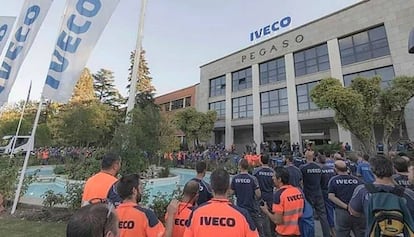Suspect in sex video suicide case interviewed by Spanish police
The former partner of the 32-year-old mother of two, who killed herself after the explicit recordings were seen by her work colleagues, claims not to have shared the files

A man suspected by the Spanish police of sharing a sexually explicit video of a woman who later committed suicide walked into a police station on Thursday at 4pm.
The suspect was taken to central headquarters in Madrid, where he was questioned about the case and denied having sent out the video that triggered the suicide of V. R., a 32-year-old mother of two who worked at an auto factory.
The woman was found dead inside her home on Saturday after allegedly enduring weeks of humiliation at work, where numerous colleagues had apparently shared the video through messaging apps such as WhatsApp.
Police sources said the suspect’s statements did not justify his arrest, and he was let go. A judge will now examine his deposition and decide whether to summon him to a hearing in court.
On Thursday, a court in Alcalá de Henares, the victim’s place of residence, launched an investigation into “discovery and revelation of secrets,” considered a crime under section 197.7 of the Criminal Code. Prosecutors are also investigating the case, as is the Spanish Data Protection Agency.
There were five files containing sexually explicit videos, according to sources familiar with the case, who said the woman had been enduring “pressure” and “anguish” for “many weeks.”
People will tell you what they know, what they don’t know but believe, or else what they’ve heard
Iveco employee
The videos were made five years ago with a former partner, and V. R. had since married and had a four-year-old child and a months-old baby.
These images ended up on the cellphones of work colleagues at Iveco, a multinational manufacturer of industrial vehicles. V. R. worked at the company’s San Blas-Canillejas factory in Madrid.
Her sister-in-law, who also works at the factory, eventually found out about the videos. So did her husband, reportedly one day before the suicide.
At the company, which employs around 2,500 workers, there were different versions of what happened. “People will tell you what they know, what they don’t know but believe, or else what they’ve heard,” said one employee. “The only truth is that [the video] was making the rounds on several cellphones, who knows how many, and that last week there were little groups talking about it and the story spread.”

Another worker said it is impossible for everyone to have been aware of the situation. “There are a great many of us, and this place is huge. Many found out on Monday, when everything had already happened.”
V. R. was one of 500 female workers on staff at a plant where women represent 23% of all employees. She started out driving forklifts, and was later transferred to the axles department, where she’d been working for several years.
Since Monday, Iveco employees have been expressing their grief and saying that “everyone is responsible” to some degree for what happened.
Olvido Hormigos and the Criminal Code
On September 5, 2012, the town of Los Yébenes (Toledo) was overrun with reporters attending the plenary session of the local council. The reason: a Socialist lawmaker, Olvido Hormigos, was expected to resign over a private video that somebody shared. “In two hours the whole town had seen it,” she explained.
But Hormigos did not step down. “There are much worse things in politics, and after all, I didn’t commit any crime. How have I hurt anyone? I am a victim,” she said.
Her case triggered a change to the Criminal Code, which now punishes those who disseminate intimate material without authorization, even if the images were originally obtained with consent.
English version by Susana Urra.
Tu suscripción se está usando en otro dispositivo
¿Quieres añadir otro usuario a tu suscripción?
Si continúas leyendo en este dispositivo, no se podrá leer en el otro.
FlechaTu suscripción se está usando en otro dispositivo y solo puedes acceder a EL PAÍS desde un dispositivo a la vez.
Si quieres compartir tu cuenta, cambia tu suscripción a la modalidad Premium, así podrás añadir otro usuario. Cada uno accederá con su propia cuenta de email, lo que os permitirá personalizar vuestra experiencia en EL PAÍS.
¿Tienes una suscripción de empresa? Accede aquí para contratar más cuentas.
En el caso de no saber quién está usando tu cuenta, te recomendamos cambiar tu contraseña aquí.
Si decides continuar compartiendo tu cuenta, este mensaje se mostrará en tu dispositivo y en el de la otra persona que está usando tu cuenta de forma indefinida, afectando a tu experiencia de lectura. Puedes consultar aquí los términos y condiciones de la suscripción digital.









































